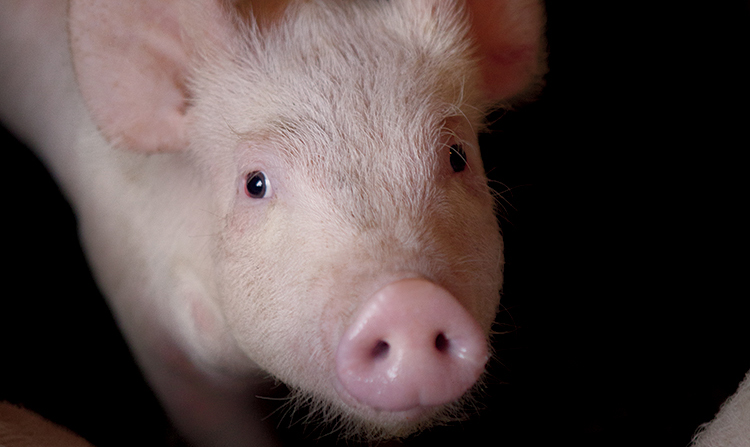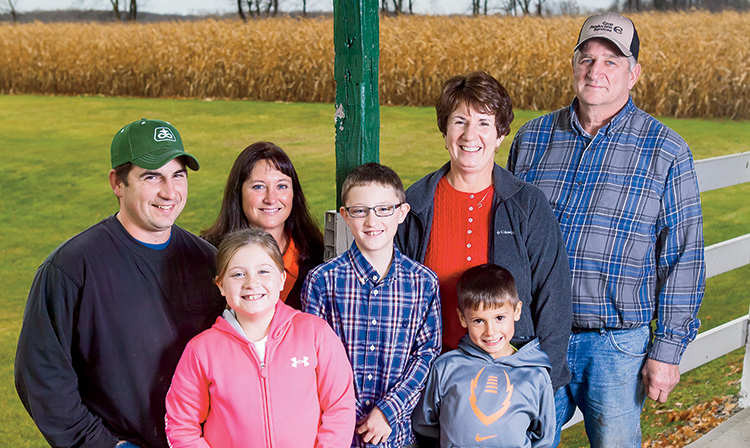Home > Michigan > Michigan Crops & Livestock > Michigan Pork Producers Push for Biosecurity
Michigan Pork Producers Push for Biosecurity
In partnership with: Michigan Department of Agriculture & Rural Development

It could be said that Keith and Brad Blonde typify the phrase “like father, like son.”
As partners in their Litchfield swine operation, they come from a long line of farmers representing the fifth and sixth generations respectively on a farm that dates to around 1911.
Both knew they wanted to make a living at hog farming from their days as youngsters in 4-H. Even while he was in college at Michigan State University, Brad Blonde was certain he wanted to return to the family farm and help his father on the 1,600-acre hog, corn and soybean operation.
“The farm has been in the family for about 103 years,” says Keith Blonde. “Off and on, there have always been hogs here on the operation.”
The Blonde family has built quite a business, marketing between 10,000 and 12,000 hogs each year. They’ve also been active in the pork industry, and have developed a reputation for their stewardship.
Their farm is certified through the Michigan Agriculture Environmental Assurance Program and the Pork Quality Assurance Plus Certification Program. Keith Blonde has served on the board of the Michigan Pork Producers Association for at least 30 years. Brad Blonde received the association’s Master Pork Producer award in 2014, and Keith received it in 1993.
The Blondes not only personify a strong father-son bond, but they’re also a good representation of Michigan’s pork industry at work. The state ranks 13th in the country in pork production.
“We’ve done a pretty good job of holding our own,” says Mary Kelpinski, executive director of the Michigan Pork Producers Association. “We have everything from small producers to the larger producers. The majority of our farms – about 98 percent – are family-owned, with several generations of pork production.”

Biosecurity A ‘Big Issue’
Like most pork farmers in Michigan – and throughout the country – the Blondes have become increasingly familiar with biosecurity practices in recent years. That’s especially the case since the swine disease known as porcine epidemic diarrhea virus (PEDv) first entered the U.S. in May 2013.
“Biosecurity is certainly a big issue, particularly with PEDv that has circulated in the last year,” Keith Blonde says. “One of our big culprits for potentially picking up the disease are the trucks that come in to pick up the hogs to take to market. They’ve been hauling hogs all over the country, and they’ve been to the packing plants where everybody goes. So we’re very strict on making sure those trucks are totally cleaned and washed. That’s not a guarantee, but it is a move that helps minimize the risk.”
Lessons Learned
The Michigan Department of Agriculture and Rural Development (MDARD) has been taking measures to help pork farmers put biosecurity in place at facilities across the state, especially in light of the PEDv situation. The state received money from the USDA in June 2014 to address PEDv concerns.
“What we’ve done so far with that money is work with Michigan State University’s swine extension team to put on training classes, hold lectures and biosecurity demonstrations, as well as provide attendees biosecurity kits for their farm,” says Dr. Nancy Barr, MDARD swine program manager.
“A lot of lessons have been learned,” she adds, “working in a collaborative way with our industry, our universities and the USDA to really invest in research in understanding the disease. I think the lessons we have learned from PEDv and biosecurity will be long-term benefits to the industry.
“So from a really difficult situation, there will be great response to move the industry forward in terms of biosecurity and research.”



